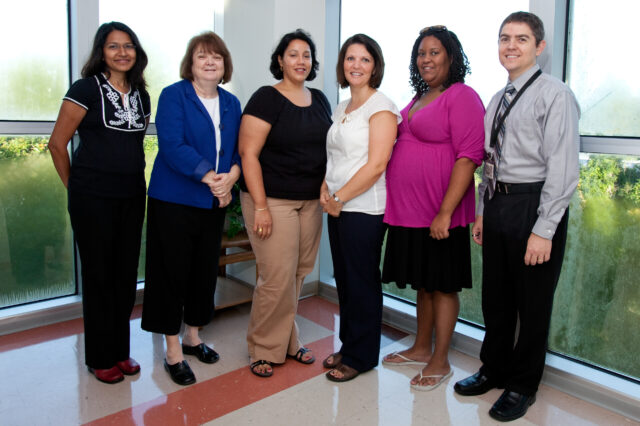New UF study examines patient treatment decisions for colorectal cancer

A University of Florida team has received a $1.2 million grant to study treatment decisions made by people with colorectal cancer. Team members include Shahnaz Sultan, M.D., Barbara Curbow, Ph.D., Elisa Rodriguez, Ph.D., Tracey Barnett, Ph.D., Evelyn King-Marshall, M.P.H., and Thomas George, M.D. (Photo by Jesse Jones/University of Florida)
A new University of Florida study will take an in-depth look at the factors involved in treatment decisions made by people with colorectal cancer. The study is funded by a $1.2 million grant from the Bankhead-Coley Florida Cancer Research Program, administered through the Florida Department of Health.
Following surgery, patients with newly diagnosed colorectal cancer are routinely asked to make a series of treatment decisions, in particular, whether to undergo chemotherapy. UF researchers will examine how these patients make decisions that fit their individual needs and offer the best health outcomes.
The National Cancer Institute estimates that in 2010 there will be more than 140,000 new cases of colorectal cancer in the United States and more than 51,000 people will die of the disease. It is the second leading cause of cancer deaths in the United States.
Typically, initial treatment involves surgery for colon cancer and surgery plus radiation for rectal cancer. But the decision to follow with chemotherapy can be difficult. While there is evidence that chemotherapy prolongs survival in stage III patients, the benefit is less clear for patients with stage II disease. Patients who undergo chemotherapy also need to make choices about the intensity of treatment.
“Ideally, information concerning treatment options should unfold as the patient and caregiver proceed through interactions with primary care physicians, surgeons, gastroenterologists and oncologists, but in reality many people don’t make their decisions that way,” said lead investigator Barbara Curbow, chairwoman of the department of behavioral science and community health in the UF College of Public Health and Health Professions and a member of the UF Shands Cancer Center.
Verbal and nonverbal communications with health-care providers and family members may influence patients’ perceptions of the seriousness of the disease, the risk of death and the need for additional treatment, she said. In fact, the researchers believe that patients may make treatment decisions before the full information on their diagnosis, including postsurgery pathology results, is available.
“One patient we interviewed for our pilot study told us that after his colonoscopy the gastroenterologist came in the room and showed him a picture of this mass in his colon,” Curbow said. “That visual led the patient to make the decision instantaneously that he would do anything to get rid of it. So you can imagine a patient whose mass was less visual, even though it may be more deadly, making the opposite decision.”
The five-year study involves three components. The first is a series of in-depth interviews with gastroenterologists and nurses about how they present diagnostic information to patients. Next, the researchers will survey 4,300 people who are about to undergo colonoscopies, and their caregivers, in order to learn their expectations, concerns and understanding of the colonoscopy procedure. In the third component, researchers will follow a subset of an estimated 137 patients who receive a diagnosis of stage II or stage III colorectal cancer to assess their decision-making process throughout treatment. Investigators will pay particular attention to differences based on race, gender, income and age.
The study is unique, Curbow said, because of the research team’s varied backgrounds and, unlike most patient decision-making studies, researchers will begin tracking the experiences of patients before they are diagnosed with an illness, in this case, before the colonoscopy.
“I think the study is going to provide a lot of really rich information, not only about the decision-making part of the treatment process further down the line, but what the colonoscopy experience means to patients,” Curbow said.
In addition to Curbow, UF team members include Tracey Barnett, an assistant professor in the department of behavioral science and community health; Dr. Thomas George, an oncologist with the UF Shands Cancer Center and an assistant professor in the College of Medicine; Dr. Shahnaz Sultan, a gastroenterologist and an assistant professor in the College of Medicine; and Elisa Rodriguez, a research assistant scientist, and doctoral student Evelyn King-Marshall, both from the department of behavioral science and community health. Amy Dailey, an assistant professor of health sciences at Gettysburg College, is also a member of the team.
“The care of patients with cancer is optimal when approached from a multidisciplinary manner,” George said. “In that same way, this research team, being comprised of physicians, oncologists, behavioral scientists, public health specialists and epidemiologists, is looking to think outside the box. The composition of this team allows for each to bring his or her discipline’s strength to the table so we can improve the care of patients with colorectal cancer.”
About the author
